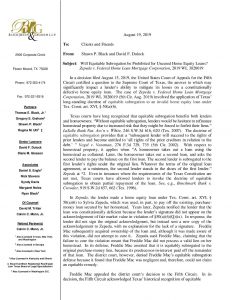In a decision filed August 15, 2019, the United States Court of Appeals for the Fifth Circuit certified a question to the Supreme Court of Texas, the answer to which may significantly impact a lender’s ability to mitigate its losses on a constitutionally defective home equity loan. The case of Zepeda v. Federal Home Loan Mortgage Corporation, 2019 WL 3820019 (5th Cir. Aug. 2019) involved the application of Texas’ long-standing doctrine of equitable subrogation to an invalid home equity loan under Tex. Const. art. XVI, § 50(a)(6).
Texas courts have long recognized that equitable subrogation benefits both lenders and homeowners. “Without equitable subrogation, lenders would be hesitant to refinance homestead property due to increased risk that they might be forced to forfeit their liens.” LaSalle Bank Nat. Ass’n v. White, 246 S.W.3d 616, 620 (Tex. 2007). The doctrine of equitable subrogation provides that a “subsequent lender will succeed to the rights of prior lenders and become entitled to ‘all rights of the prior creditors in relation to the debt.’ ” Vogel v. Veneman, 276 F.3d 729, 735 (5th Cir. 2002). With respect to homestead property, it applies when “A homeowner takes out a loan using the homestead as collateral. Later, the homeowner takes out a second loan, and asks the second lender to pay the balance on the first loan. The second lender is subrogated to the first lender’s rights under the original lien. Whatever the terms of the original loan agreement, at a minimum, the second lender stands in the shoes of the first lender.” Zepeda at *2. Even in instances where the requirements of the Texas Constitution are not met, Texas courts have allowed lenders to invoke the doctrine of equitable subrogation to obtain partial repayment of the loan. See, e.g., Benchmark Bank v. Crowder, 919 S.W.2d 657, 662 (Tex. 1996).

